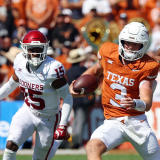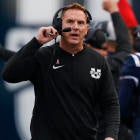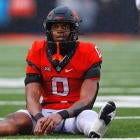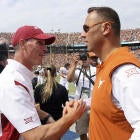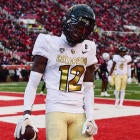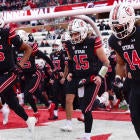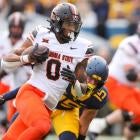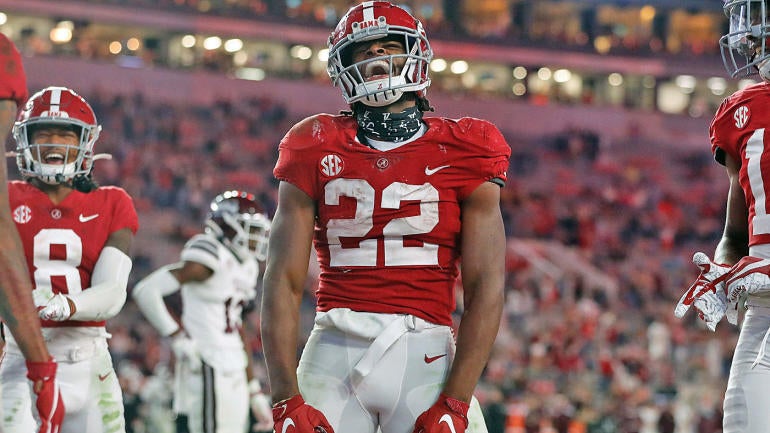
On his way to and from high school each day, Najee Harris would walk a route they called "The Zone". In Antioch, California, the label had nothing to do with football and everything to do with survival.
"A lot of people won't say it. There was a lot of violence going on there and strictly in his neighborhood alone," said Marcus Malu, Harris' personal trainer since his freshman year of high school. "This kid would walk in the middle of the night from the football field in the middle of a war zone and nobody would touch him."
Antioch is a city of 110,000 souls nestled in the East Bay across from San Francisco. It is not unlike dozens of towns where high school stars find their way "out". Football as vehicle to a better life is a prospect unique to the United States.
However, Najee Harris is unique to Antioch. He is a hero in dreadlocks, a beacon of hope wrapped in a cheerful smile. A piece of the town who will never leave despite becoming Alabama's career rusher leader on his way to the NFL.
He will get there having walked The Zone.
"I knew this individual. He's no longer with us, one of the big honchos out there," Malu said. "He pulled up on Najee one night. 'You Najee Harris?' He said, 'Uh, yeah.'"
In the moment, Harris was spooked. That "big honcho" ruled the streets.
"'Just going to let you know, nobody's going to touch you,'" Malu recalls the individual telling Harris.
"When the 'hood knows there's somebody who has a chance to get out, they look after you. The incident Najee had with that gentleman, he was able to get a pass."
That pass might end up being bigger than any All-America honor or Heisman Trophy slight for the senior tailback. The fact that Harris is in Tuscaloosa, Alabama, thriving should be victory enough. But in terms of all-timers at this moment before the College Football Playoff National Championship, the case can be made Harris has been underrated in a program full of stars that stresses the team-oriented Process every day.
He quietly became Bama's career leading rusher last month. Well, relatively quietly. In rushing for 178 yards in the SEC Championship Game, Harris accounted for five touchdowns. He and Heisman winner DeVonta Smith became the first pair of teammates to each score 20 touchdowns. The stuff that isn't noticed all the time, pass blocking and pass catching, will serve him well at the next level.
The argument can be made that Harris was Alabama's MVP this season. His ability to balance the offense kept teams from blitzing and getting more physical with receivers. Consider the Arkansas game. Razorbacks coach Sam Pittman decided to use a "33 zone" defense, a version of the 3-3-5 stack. Both Smith and quarterback Mac Jones each had their lowest outputs of the season. Harris? He ran for 216 yards and six touchdowns.
A quarter of his rushing touchdowns this season (five out of 20) have come on third down. Talk about clutch.
But even if he had never taken a snap, Harris would still be the San Jose Mercury News' Bay Area high school offensive player of the decade. He finished 52 yards short of 8,000 for his career, the fourth-highest total in California history.
Harris still represents Antioch. He is currently one of the Alabama "Triplets" -- along with Smith and Jones -- the tip of perhaps the most lethal offensive spear in program history. If the Chicago Bulls needed Dennis Rodman to go with Michael Jordan and Scottie Pippen, if the Dallas Cowboys needed Emmitt Smith to go with Troy Aikman and Michael Irvin, then Alabama needed Harris this season.
"I asked him, 'Why do you want to go to Alabama?'" Malu recalled. "I wanted to hear from him. He said, 'I get to see the best in practice every day. That way, the game is going to be a cakewalk.'"
Four years later, Jones and Smith became finalists and finished ahead of Harris in Heisman voting. Harris finished fifth. Two Bama tailbacks have already won the Stiff Arm since 2009 (Mark Ingram, Derrick Henry), but Harris already seems more dynamic, faster, maybe even better than those two.
So traveling across country and figuring out the cultural change from Northern California to the Deep South wasn't such a big deal. At least not to those who knew Harris best.
"Everybody on this side of the Rocky Mountains expected this out of Najee Harris," said Juan Corral, former quarterback coach at Antioch High School. "Anybody who can see the Pacific Ocean, man, they knew about Najee Harris."
They will remember him in the East Bay for the way he embraced their adoration, their help, even their love. Harris is coming back some day, just not now. Because of COVID-19, he has not been home once since June.
It helps that his mother Tianna Hicks has relocated to the Tuscaloosa. The family's story of homelessness has dimmed. Harris' father is out of the picture. In 2013, when the family moved from Seattle to Antioch, there were bullet holes in the home's garage, according to the San Francisco Chronicle.
"There is kind of a warp hole in this area," said Corral, now the quarterbacks coach at rival Pittsburg High School. "It's kind of like the New York five boroughs. If you live in one of those boroughs, you really don't have to go far from where your house is to get everything you need.
"That's kind of how it is here. We're very well aware of the issues and struggles that come with living in this area. It's not some impoverished area of the world."
Antioch's violent crime rate spiked in 2012 with 1,107 incidents per 100,000 members of the population. The California is average is 424. In the United States, it is 388. In 2018, Antioch was ranked the 20th out of the 100 most dangerous cities in California. But since 2012, that violent crime rate has dropped precipitously.
"I overcame a lot at a young age," Harris said. "But I guess I wouldn't take any of it back because I learned a lot from it, from financially and being grateful for the little things that I have."
A significant chapter will close Monday night. Alabama's 2017 recruiting class will go down in history. Harris was the highest-rated member of a 29-player class that included six five-stars prospects and 18 four-stars. At least 14 starters came out of that group that included a Heisman winner (Smith) and another finalist (Tua Tagovailoa).
By the end of their freshman season, the class was directly responsible for a national championship. Tagovailoa threw the title-winning pass to Smith to beat Georgia in overtime. Harris entered at halftime of that game to spark the Crimson Tide after they were shut out in the first 30 minutes.
In four seasons, Harris has showcased that rare combination of elusiveness, power and finesse. When Saban needed to run the clock in the fourth quarter of the victory over Georgia, Smith got the ball 14 times for 56 yards. When a shootout developed against Florida in the SEC Championship Game this year, Harris had career day receiving, hauling in five balls for 67 yards and three touchdowns.
Long before that, Harris was made an honorary member of the "Rydeouts," the self-declared nickname of Alabama's receivers.
"They finally accepted me," he said.
According to Corral, Antioch always went for two after touchdowns because of Harris. Why wouldn't you?
"We would even flex him out and throw fade balls to him," Corral said. "When the narrative comes up, 'Ah, he doesn't really catch the ball very well,' we've got the receipts."
When all of the 6-foot-2, 230-pound Harris hurdled a Notre Dame tackler in the Rose Bowl semifinal, it reminded Corral of what the running back couldn't do in high school.
"In California, it's illegal to hurdle a standing player," he said. "If you think about it, Najee probably would have had another 400-500 yards if it wasn't."
The circus that usually pitches a tent around top recruits did not bypass Antioch. Harris actually spent a couple of days visiting lowly Kansas during the recruiting process. Michigan's Jim Harbaugh came hard, staging one of his infamous satellite camps at the school. That was basically an elaborate recruiting pitch for Harris.
"You want to do it to get the biggest eyes on Najee," Corral said. "He wasn't doing it for the [prospects] he saw that day. Najee was awesome. I think the biggest thing that came out of the satellite camp is Najee got to work with Tyrone Wheatley that day. All they did was work pass protection."
Wheatley is a former All-Big Ten runner and Rose Bowl MVP. That pass blocking ability is credited with enhancing Harris' value as a complete back.
"I didn't like it," Harris said of the recruiting process. "It's too much attention, way too much attention for me. I think I just showed up here. I just showed up. I didn't even tell them I was coming here. I was tired of [recruiting]. I popped up at the airport with Tua."
And just like that, he'll be gone after Monday. What snippets we've gotten to see of Harris up close during this Zoom-infused season have been totally enjoyable. That smile, that personality suggest there is something more in his future besides football.
Harris has taken to celebrating touchdowns the same way as women's Olympic soccer star Megan Rapinoe.
Roll Tide! 🐘🏈💪🏻 pic.twitter.com/AZvAbky9tZ
— Michele Montgomery (@MMontgomery_UA) December 30, 2020
Why a college tailback from the East Bay would take to admiring a 35-year-old Olympic athlete/activist doesn't seem to make sense. Except they are both from California.
"First of all, she listens to Nipsey -- Nipsey Hustle [is] one my favorite rappers," Harris said of the late artist. "She gave a shout out to him. Really, [it's because of] all the stuff she stands for. She's a feminist and [mentions] how women in the world get treated unfairly and how they get paid different than men. She stands up for all that … I guess you could say like maybe not too many males will say they look up to a woman nowadays, but I really look up to her."
None of this is happening if Harris had left early for the NFL Draft after the 2019 season. He was coming off a 1,200-yard rushing season, which was good. This season, Harris has become great.
Saban remains a wizard at helping most of his juniors make the right NFL decision. Prior to the 2020 season, Harris was ranked 70th out of the top 100 players by CBS Sports. In May, Harris wasn't among the top five running backs by several draft experts. Now, he is regarded as an early second-round pick, perhaps the first running back off the board in April.
"What we try to do is be realistic with the players in terms of helping them make a good business decision for them and their family," Saban said. "We try to make them aware of how the money sort of goes down in the draft.
"There's no developmental league in football. That's different that baseball that has minor leagues. Hockey has a minor league. NBA has a G-League. So the one place that you can continue to develop and create value for yourself is to stay in school."
There's also the potential of injury in being realistic. When that question was posed to Harris earlier this season, we got a glimpse of what that lies beneath.
"Why do you want to ask me that question?" Harris said. "I don't want to talk about injuries. Any day, any play. You can't really think about that type of stuff, especially being an active athlete. Injuries aren't rare. They can happen from the smallest play. Say what happened in the NFL with Dak [Prescott]. I don't want to answer that question. You can't put that on athlete right now. Knock on wood it doesn't happen."
Harris represents an ongoing West Coast talent drain. The likes of Harris, Tagovailoa, current Alabama quarterback Bryce Young -- as well as Clemson QB D.J. Uiagalelei -- have all left the area for the South. In a previous era, all four would be at Pac-12 schools, certainly west of the Rocky Mountains. But the Pac-12 has slumped so badly in terms of perception that it makes it easier for the region's top talent to go elsewhere. Especially when Alabama and Clemson are competing for championships year after year.
"Before Najee, there weren't that many guys that went across the Mississippi," Corral said. "For the most part, everybody stayed home. As far as the West Coast [now], we feel like it's given us respect."
All Malu remembers is how it started: a dedicated kid with dreadlocks showing up at his gym at 4 a.m. each day to work out.
"Najee was a bringing a little bit of light to a place," he said. "We knew on Friday we were going to go support the kid."



